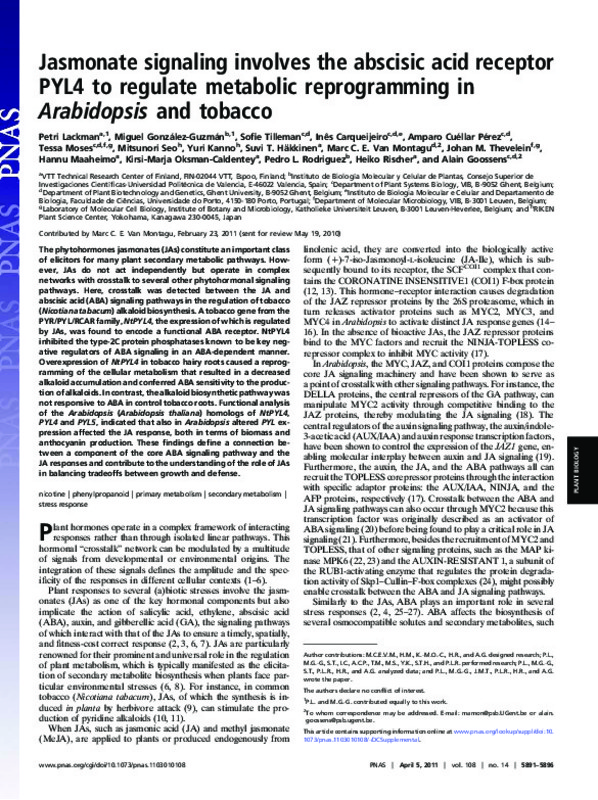JavaScript is disabled for your browser. Some features of this site may not work without it.
Buscar en RiuNet
Listar
Mi cuenta
Estadísticas
Ayuda RiuNet
Admin. UPV
Jasmonate signaling involves the abscisic acid receptor PYL4 to regulate metabolic reprogramming in Arabidopsis and tobacco
Mostrar el registro sencillo del ítem
Ficheros en el ítem
| dc.contributor.author | Lackman, Petri
|
es_ES |
| dc.contributor.author | González Guzmán, Miguel
|
es_ES |
| dc.contributor.author | Tilleman, Sofie
|
es_ES |
| dc.contributor.author | Carqueijeiro, Ines
|
es_ES |
| dc.contributor.author | Perez Cuellar, Amparo
|
es_ES |
| dc.contributor.author | Moses, Tessa
|
es_ES |
| dc.contributor.author | Seo, Mitsunori
|
es_ES |
| dc.contributor.author | Kanno, Yuri
|
es_ES |
| dc.contributor.author | Hakkinen, Suvi T
|
es_ES |
| dc.contributor.author | Van Montagu, Marc C. E
|
es_ES |
| dc.contributor.author | Thevelein, Johan
|
es_ES |
| dc.contributor.author | Maaheimo, Hannu
|
es_ES |
| dc.contributor.author | Oksman-Caldentey, Kirsi-Marja
|
es_ES |
| dc.contributor.author | Rodríguez Egea, Pedro Luís
|
es_ES |
| dc.contributor.author | Rischer, Heiko
|
es_ES |
| dc.contributor.author | Goossens, Alain
|
es_ES |
| dc.date.accessioned | 2017-06-07T09:30:02Z | |
| dc.date.available | 2017-06-07T09:30:02Z | |
| dc.date.issued | 2011-04-05 | |
| dc.identifier.issn | 0027-8424 | |
| dc.identifier.uri | http://hdl.handle.net/10251/82504 | |
| dc.description.abstract | [EN] The phytohormones jasmonates (JAs) constitute an important class of elicitors for many plant secondary metabolic pathways. However, JAs do not act independently but operate in complex networks with crosstalk to several other phytohormonal signaling pathways. Here, crosstalk was detected between the JA and abscisic acid (ABA) signaling pathways in the regulation of tobacco (Nicotiana tabacum) alkaloid biosynthesis. A tobacco gene from the PYR/PYL/RCAR family, NtPYL4, the expression of which is regulated by JAs, was found to encode a functional ABA receptor. NtPYL4 inhibited the type-2C protein phosphatases known to be key negative regulators of ABA signaling in an ABA-dependent manner. Overexpression of NtPYL4 in tobacco hairy roots caused a reprogramming of the cellular metabolism that resulted in a decreased alkaloid accumulation and conferred ABA sensitivity to the production of alkaloids. In contrast, the alkaloid biosynthetic pathway was not responsive to ABA in control tobacco roots. Functional analysis of the Arabidopsis (Arabidopsis thaliana) homologs of NtPYL4, PYL4 and PYL5, indicated that also in Arabidopsis altered PYL expression affected the JA response, both in terms of biomass and anthocyanin production. These findings define a connection between a component of the core ABA signaling pathway and the JA responses and contribute to the understanding of the role of JAs in balancing tradeoffs between growth and defense. | es_ES |
| dc.description.sponsorship | We thank Freya Lammertyn, Robin Vanden Bossche, Lander Ingelbrecht, Astrid Nagels Durand, Laurens Pauwels, Jacob Pollier, Siv Matomaa, Jaana Rikkinen, and Yuji Kamiya for excellent technical assistance and advice; Wilson Ardiles-Diaz for sequencing the cDNA–amplified fragment length polymorphism tags; and Martine De Cock for help in preparing the manuscript. This work was supported by the European FP7 project SMARTCELL (222716) and the Spanish Ministry for Science and Innovation (Grant BIO2008-00221 to P.L.R.). S.T., T.M., and P.L. are indebted to the Agency for Innovation by Science and Technology, the VIB International Ph.D. Fellowship Program for predoctoral fellowships and the Glycoscience Graduate School, respectively. M.G.-G is supported by a “Juan de la Cierva” contract from the Spanish Ministry for Science and Innovation. | |
| dc.language | Inglés | es_ES |
| dc.publisher | National Academy of Sciences | es_ES |
| dc.relation.ispartof | Proceedings of the National Academy of Sciences | es_ES |
| dc.rights | Reserva de todos los derechos | es_ES |
| dc.subject | Nicotine | es_ES |
| dc.subject | Phenylpropanoid | es_ES |
| dc.subject | Primary metabolism | es_ES |
| dc.subject | Secondary metabolism | es_ES |
| dc.subject | Stress response | es_ES |
| dc.subject.classification | MICROBIOLOGIA | es_ES |
| dc.subject.classification | BIOQUIMICA Y BIOLOGIA MOLECULAR | es_ES |
| dc.title | Jasmonate signaling involves the abscisic acid receptor PYL4 to regulate metabolic reprogramming in Arabidopsis and tobacco | es_ES |
| dc.type | Artículo | es_ES |
| dc.identifier.doi | 10.1073/pnas.1103010108 | |
| dc.relation.projectID | info:eu-repo/grantAgreement/EC/FP7/222716/EU/Rational design of plant systems for sustainable generation of value-added industrial products/ | es_ES |
| dc.relation.projectID | info:eu-repo/grantAgreement/MICINN//BIO2008-00221/ES/REGULACION POR ACIDO ABSCISICO DE LA RESPUESTA AL ESTRES HIDRICO, CRECIMIENTO Y DESARROLLO VEGETAL/ | |
| dc.rights.accessRights | Abierto | es_ES |
| dc.contributor.affiliation | Universitat Politècnica de València. Instituto Universitario Mixto de Biología Molecular y Celular de Plantas - Institut Universitari Mixt de Biologia Molecular i Cel·lular de Plantes | es_ES |
| dc.contributor.affiliation | Universitat Politècnica de València. Departamento de Biotecnología - Departament de Biotecnologia | es_ES |
| dc.description.bibliographicCitation | Lackman, P.; González Guzmán, M.; Tilleman, S.; Carqueijeiro, I.; Perez Cuellar, A.; Moses, T.; Seo, M.... (2011). Jasmonate signaling involves the abscisic acid receptor PYL4 to regulate metabolic reprogramming in Arabidopsis and tobacco. Proceedings of the National Academy of Sciences. 108(14):5891-5896. https://doi.org/10.1073/pnas.1103010108 | es_ES |
| dc.description.accrualMethod | S | es_ES |
| dc.relation.publisherversion | http://doi.org/10.1073/pnas.1103010108 | es_ES |
| dc.description.upvformatpinicio | 5891 | es_ES |
| dc.description.upvformatpfin | 5896 | es_ES |
| dc.type.version | info:eu-repo/semantics/publishedVersion | es_ES |
| dc.description.volume | 108 | es_ES |
| dc.description.issue | 14 | es_ES |
| dc.relation.senia | 218952 | es_ES |
| dc.identifier.pmid | 21436041 | en_EN |
| dc.identifier.pmcid | PMC3078376 | |
| dc.contributor.funder | European Commission | |
| dc.contributor.funder | Ministerio de Ciencia e Innovación |








